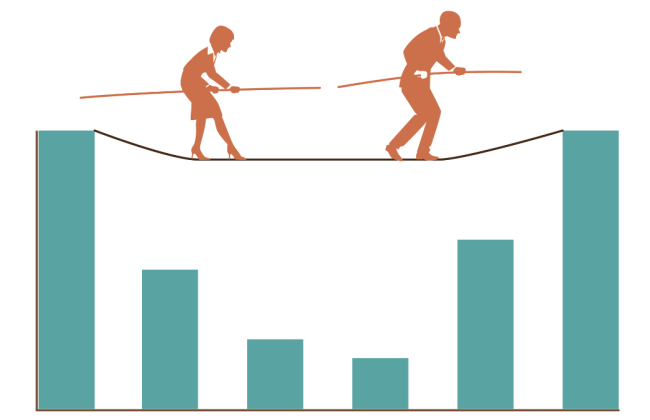You have /5 articles left.
Sign up for a free account or log in.

Getty Images
Economics is still a field dominated by men. Why is that? While most undergraduate economics majors are male, a new study suggests that women who do go on to earn Ph.D.s in economics have a harder time earning tenure and getting promoted than do their male peers, and that the gender gap is even more pronounced among international Ph.D.s. Additionally, relatively more female economists than male economists leave academe within a tenure cycle of earning their Ph.D.s.
The study, to be presented at the upcoming meeting of the American Economic Association and currently under review for publication, stands out in that it examines early career outcomes from 57 economics Ph.D. programs, as opposed to just a handful of top programs.
First, a brief snapshot: women represent 31 percent of assistant professors in economics, according to recent data from the economic association, and 15 percent of full professors. Women make up about one-third of new doctoral recipients in economics, and their ranks are growing -- as is the number of international Ph.D.s, according to the paper.
The study, “Do Female Professors Survive the 19th-Century Tenure System? Evidence From the Economics Ph.D. Class of 2008,” draws on data from an earlier paper by two of its authors, which found that newly minted female economics Ph.D.s from 2008 were 8 percent less likely to find jobs in academe than their male counterparts. A new round of data highlighted in the current study tracks those 587 Ph.D.s' early career outcomes, as of this fall, eight years on.
Controlling for demographics and various doctoral program characteristics, the authors found that women in the class of 2008 were 10 percentage points less likely to receive tenure, relative to their male peers, by 2016 (27 percent compared to 17 percent). Results are the same when the sample is limited to only those who had initial tenure-track appointments back in 2008.
“These findings suggest that female economists in the sample are less likely to survive the tenure system as a whole,” the paper says.
As for why, the paper offers a few theories: “Compared to their male peers, women assistant professors would bear a greater share of responsibilities for starting and raising young families during a fast-closing window parallel for both tenure and biological clocks.” In addition, it says, “university administrators often seek diversity in committee composition. As a result, females from disciplines where women are scarce (such as economics) are burdened with excess service duties, which would further hinder their productivity and in turn advancement prospects.”
Unlike their male colleagues, “the same supporting and mentoring networks may not be as abundant to females in largely male-dominated fields such as economics,” the paper says. “Another subtle factor is that work and professional climate may be generally less friendly to female faculty.”
Dividing the sample by citizenship, female international faculty members are about 12 percentage points less likely than their male counterparts to earn tenure and promotion. Compared to economists from Europe, Asians have a more balanced gender ratio in tenure rates in the sample. The authors guess that the "relatively large number of Asian females in the discipline may have provided a more effective supporting network among themselves, ceteris paribus, compared to those from other regions.” Regarding whether or not those granted Ph.D.s in 2008 stayed in academe, female faculty members -- particularly women from other countries working in the U.S. -- are less likely to remain during the first eight years of their postdoctoral careers.
More efforts are needed “at the local/university level to implement policies that enhance work-life balance, including teaching relief, stop the clock, or even part-time tenure-track positions for parents with young families,” the paper concludes. “Furthermore, more women are needed in university leadership positions to serve as role models for female faculty and students alike.”
The paper was written by economists Jihui Chen, associate professor at Illinois State University, Myongjin Kim, assistant professor at the University of Oklahoma, and Qihong Liu, associate professor at Oklahoma.
Chen, who co-wrote the earlier paper with Liu, said via email, “Our econometric analysis shows that most demographic and doctoral program characteristics do not affect career outcomes, after controlling for initial job placement outcomes. However, gender still matters.”
As for why gender continues to matter, Chen said subconscious bias remains an important factor. “In our paper, we discuss that lack of networking and mentorship might be a potential factor, since the field has a smaller number of females,” she added. “Using an analogy, in microeconomics, there is a term called ‘critical mass,’ which is critical in the presence of network effects. While the female ratio in economics (and many other math-intensive disciplines) has been increasing over the last several decades, it may have not reached the ‘critical mass’ yet, especially toward the top echelon. As a result, females still have to face the constant upward battle, more so than their male peers.”





